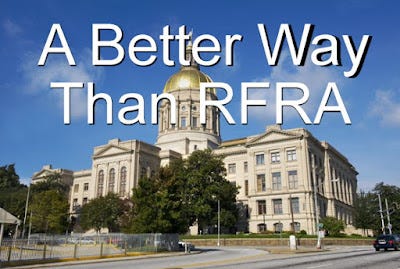RFRA Doesn’t Do the Job

After last year’s Georgia General Assembly, Governor Deal vetoed the Religious Freedom Act (RFRA) passed by both Houses. I wrote at the time, “Fine, good for you Mr. Governor.” I wrote that not because I am against the peaceful exercise of religion, but because in the final analysis that bill does nothing to prevent the government from stepping once again where it has no authority, and infringing on religious freedoms already protected under the 1st Amendment. RFRA is not legislation constructed to somehow enforce the 1st Amendment. RFRA merely seeks to minimize the degree to which the government might assert powers it does not possess and thus continue violating the 1st Amendment.
At the federal level, the 1st Amendment is clear, “Congress shall make no law infringing the free exercise of religion.” What part of “make no law” do the federal courts not understand? And if Congress “shall make no law,” then what law might the federal courts interpret in order to restrict religious freedom? None of that really makes sense.
At our state level, as I will show you, a perceived need for RFRA is already circumvented in the Georgia Constitution. We do not need RFRA. Instead we need a law clarifying for the courts what the Georgia Constitution already requires.
So how did the federal courts, and now possibly our state courts, weasel the means necessary to limit that which our founders went out of their way to document as personal freedoms protected under the US Constitution? The answer is that the federal courts simply made stuff up. Years ago, the federal courts conjured and applied an unconstitutional doctrine, drawn from nothing, adapting it enough times to enough circumstances until it became accepted constitutional law. That unauthoritative doctrine literally personifies the government, holding that the government possesses certain interests of its own, above and beyond those of the people. And in the eyes of the courts, when government interests reach a certain threshold of importance, they become, “compelling.” It is that doctrine asserting, “compelling government interest,” found nowhere in the US Constitution, that the courts have used to justify intervening in cases in which they have no authority and no business in the first place. And it is that same unauthoritative doctrine, conceivably used by our state courts, that the present RFRA bill attempts to restrict. But to even hear cases of the variety treated by RFRA bills, the courts must assume powers they do not have.
The Georgia Constitution is clear, stipulating, “All government, of right, originates with the people, is founded upon their will only.” What part of “only” might Georgia courts not grasp? The Georgia RFRA legislation under consideration assumes the state constitution does not exist and that Georgia Government possesses its own prerogatives apart from and superseding the will of the people. In attempting to merely limit powers the state government does not have anyway, RFRA tacitly agrees those powers exist and hands them over. RFRA is therefore a very dangerous way to deal with the issue of religious freedom within our state.
And so this entire question whether the government can justifiably limit the peaceful exercise religion and religious expression is only by judicial hocus pocus. Regardless how many times and ways the federal or state courts might try to express it, government possesses no interests in and of itself. Only people possess interests and the function of government is to respect and protect those interests, not rise above them.
Fortunately, to prevent harm to the states by judicial activists at the federal level our founders provided us with peaceful constitutional tools, the 9th and 10th Amendments. Deriving from those provisions is a tool the states always possess, and which can and should be used to resist a tyrannical federal government. And that is their ability to peacefully refuse to recognize federal policies and legal opinions that fly in the face of the US Constitution. The governor, together with Georgia legislature, have that power. If they do not, the 9th and 10th Amendments have no meaning, are null and should simply be repealed.
And so rather than the state legislature enacting a law to restrict the use of governmental authorities that don’t exist anyway, why not more effectively legislate to clarify that the courts simply do not have that authority? Doing so would reign in judicial activism on the state level and authorize the governor to decline recognition of policies and judicial opinions projected on the states from the federal level, thus effectively nullifying rogue federal policies within the boundaries of the State of Georgia. Rather than a “Religious Freedom Restoration Act” enacted into law at the state level, the people of Georgia really need a “People’s Interests Restoration Act (PIRA),” one that would spell out to the courts that they shall not utilize unauthoritative doctrines such as, “compelling government interest” to decide cases. Religious freedom problem solved, and without objection from the normal actors.
Fortunately, PIRA is already written and ready to be dropped in the hopper. I wonder if any of our Forsyth and Dawson County state legislators have the courage to defy the conventional wisdom and the erroneous politics regarding the protection of religious freedom in Georgia? I suggest you contact them and urge them to step out and lead.



